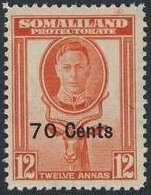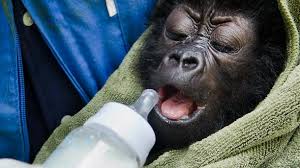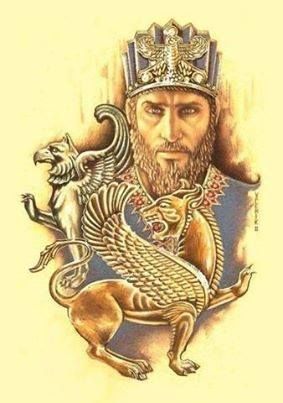Stamp: George VI, Lesser Kudu (Tragelaphus imberbis) - Overprinted (British colonies and territories 1951)
George VI, Lesser Kudu (Tragelaphus imberbis) - Overprinted (British colonies and territories 1951)
02 April (British colonies and territories ) within release Somaliland goes into circulation Stamp George VI, Lesser Kudu (Tragelaphus imberbis) - Overprinted face value 70 British Somaliland cent
| Stamp George VI, Lesser Kudu (Tragelaphus imberbis) - Overprinted in catalogues | |
|---|---|
| Michel: | Mi:GB-SO 115 |
| Stamp Number: | Sn:SO 122 |
Stamp is square format.
Also in the issue Somaliland:
- Stamp - George VI, Black-headed Somalisheep (Ovis orientalis aries) face value 5;
- Stamp - George VI, Black-headed Somalisheep (Ovis orientalis aries) face value 10;
- Stamp - George VI, Black-headed Somalisheep (Ovis orientalis aries) face value 15;
- Stamp - George VI, Lesser Kudu (Tragelaphus imberbis) - Overprinted face value 20;
- Stamp - George VI, Lesser Kudu (Tragelaphus imberbis) - Overprinted face value 30;
- Stamp - George VI, Lesser Kudu (Tragelaphus imberbis) - Overprinted face value 50;
- Stamp - George VI, Lesser Kudu (Tragelaphus imberbis) - Overprinted face value 70;
- Stamp - 1 Shilling of 1 Rupie(Mi.Nr.:97) face value 1;
- Stamp - 2 Shilling of 2 Rupie(Mi.Nr.:98) face value 2;
- Stamp - 2 Shilling of 3 Rupie(Mi.Nr.:99) face value 2;
- Stamp - 5 Shilling of 5 Rupie(Mi.Nr.:100) face value 5;
Stamp George VI, Lesser Kudu (Tragelaphus imberbis) - Overprinted it reflects the thematic directions:
Mammals are any vertebrates within the class Mammalia (/məˈmeɪli.ə/ from Latin mamma "breast"), a clade of endothermic amniotes distinguished from reptiles (including birds) by the possession of a neocortex (a region of the brain), hair, three middle ear bones and mammary glands. All female mammals nurse their young with milk, secreted from the mammary glands. Mammals include the largest animals on the planet, the great whales. The basic body type is a terrestrial quadruped, but some mammals are adapted for life at sea, in the air, in trees, underground or on two legs. The largest group of mammals, the placentals, have a placenta, which enables the feeding of the fetus during gestation. Mammals range in size from the 30–40 mm (1.2–1.6 in) bumblebee bat to the 30-meter (98 ft) blue whale. With the exception of the five species of monotreme (egg-laying mammals), all modern mammals give birth to live young. Most mammals, including the six most species-rich orders, belong to the placental group. The largest orders are the rodents, bats and Soricomorpha (shrews and allies). The next three biggest orders, depending on the biological classification scheme used, are the Primates (apes and monkeys), the Cetartiodactyla (whales and even-toed ungulates), and the Carnivora (cats, dogs, seals, and allies).
King is the title given to a male monarch in a variety of contexts. The female equivalent is queen regnant (while the title of queen on its own usually refers to the consort of a king). In the context of prehistory, antiquity and contemporary indigenous peoples, the title may refer to tribal kingship. Germanic kingship is cognate with Indo-European traditions of tribal rulership (c.f. Indic rājan, Gothic reiks, and Old Irish rí, etc.) In the context of classical antiquity, king may translate Latin rex or either Greek archon or basileus. In classical European feudalism, the title of king as the ruler of a kingdom is understood as the highest rank in the feudal order, potentially subject, at least nominally, only to an emperor (harking back to the client kings of the Roman Empire). In a modern context, the title may refer to the ruler of one of a number of modern monarchies (either absolute or constitutional). The title of king is used alongside other titles for monarchs, in the West prince, emperor, archduke, duke or grand duke, in the Middle East sultan or emir; etc. Kings, like other royalty, tend to wear purple because purple was an expensive color to wear in the past.
The term antelope refers to numerous extant or recently extinct species of the ruminant artiodactyl family Bovidae that are indigenous to most of Africa, India, the Middle East, Central Asia, and a small area of Eastern Europe. Antelopes do not form a monophyletic group, as some antelopes are more closely related to other bovid groups, like bovines, goats, and sheep, than to other antelopes.
A better definition, also known as the "true antelopes", includes only the genera Gazella, Nanger, Eudorcas, and Antilope. One North American mammal, the pronghorn or "pronghorn antelope", is colloquially referred to as the "American antelope", despite the fact that it belongs to a completely different family (Antilocapridae) than the true Old-World antelopes; pronghorn are the sole extant member of an extinct prehistoric lineage that once included many unique species.
Animals are multicellular, eukaryotic organisms of the kingdom Animalia (also called Metazoa). All animals are motile, meaning they can move spontaneously and independently, at some point in their lives. Their body plan eventually becomes fixed as they develop, although some undergo a process of metamorphosis later on in their lives. All animals are heterotrophs: they must ingest other organisms or their products for sustenance.




